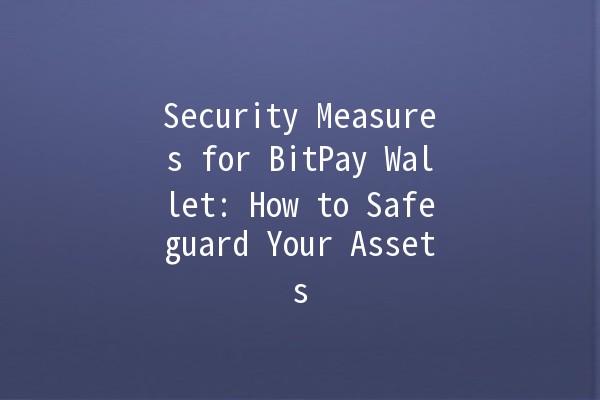
In the world of cryptocurrency, security is paramount for protecting your digital assets. BitPay Wallet, a popular cryptocurrency wallet, provides various security features that ensure users' funds remain safe from potential threats. This article explores the essential security measures implemented by BitPay Wallet and offers practical tips to enhance your asset protection.
Table of Contents

The rise of cryptocurrencies has introduced new challenges in securing digital assets. Unlike traditional bank accounts insured by the government, cryptocurrency holdings are susceptible to hacks and fraud. Understanding the importance of security measures in wallets like BitPay is crucial for all cryptocurrency users.
Why Security Measures Matter
Protection from Hacks: Digital assets are often targeted by cybercriminals, making robust security necessary.
User Accountability: Unlike conventional banking, users are solely responsible for securing their assets.
Maintaining Trust in Crypto: Effective security measures enhance user confidence in cryptocurrency systems and wallets.
Key Statistics
According to a report, in 2021 alone, over $14 billion worth of cryptocurrency was stolen due to hacks.
Over 50% of new cryptocurrency users express concern about the security of their holdings.
BitPay Wallet offers Multsignature (multisig) functionality, an essential security protocol that requires multiple keys to authorize a transaction. This additional layer of security significantly reduces the risk of unauthorized access.
How Multisig Works
Multiple Signatures: Transactions require more than one signature or private key to be executed.
Distributed Risk: Even if one key is compromised, the assets remain safe as additional signatures are needed for transactions.
Practical Application Example
Imagine a business that uses BitPay Wallet for transactions. By implementing multisig, the business can require approvals from both the owner and an accountant before any substantial withdrawal, greatly minimizing the risk of fraud.
TwoFactor Authentication (2FA) is a staple security measure designed to provide an extra layer of protection for user accounts. BitPay Wallet incorporates 2FA to help secure user logins.
What is 2FA?
Additional Login Requirement: Besides the password, users must provide another form of identification, typically a onetime code sent to their mobile device.
Prevents Unauthorized Access: 2FA adds a significant barrier against unauthorized users attempting to access an account.
RealWorld Example
Consider a scenario where a hacker intercepts a user’s password. With 2FA enabled, the hacker would still require access to the user's mobile device to obtain the onetime code, significantly reducing the likelihood of a successful breach.
Cold storage refers to offline methods of storing cryptocurrency to protect it from online threats. BitPay Wallet encourages users to consider this option for longterm asset storage.
Types of Cold Storage
Hardware Wallets: Dedicated devices that store cryptocurrencies offline.
Paper Wallets: Physical printouts of private keys that are kept in secure settings.
Benefits of Cold Storage
Robust Protection: By keeping assets offline, cold storage eliminates exposure to online hacking attempts.
LongTerm Security: Ideal for users looking to hold assets for extended durations without frequent transactions.
Application Example
A user planning to hold a significant amount of cryptocurrency for several years could invest in a hardware wallet. This method ensures that their holdings are secure and inaccessible via internet threats.
Frequent updates to wallet software are critical for maintaining security. BitPay Wallet regularly provides updates to patch vulnerabilities and improve security features.
Importance of Software Updates
Fixes Vulnerabilities: Updates often address previously discovered security flaws.
Enhancements: They can introduce new security features and improve user experience.
User Responsibility
Users should enable automatic updates or routinely check for updates to ensure they are using the latest version of their wallet, which is crucial for staying protected against potential threats.
Educating users about security measures and best practices is vital in ensuring the safety of their digital assets. BitPay Wallet actively provides resources to aid users in understanding how to protect their accounts.
Best Practices for Users
Use Strong Passwords: Create complex passwords that combine letters, numbers, and symbols.
Avoid Public WiFi: Do not access wallet accounts over unsecured networks.
Stay Informed: Regularly read up on crypto security to stay aware of potential threats and protective measures.
Example of User Engagement
A user who follows BitPay Wallet’s educational resources might participate in community forums to discuss relevant security issues, thus enhancing their knowledge and understanding of cryptocurrency safety.
Q1: What should I do if I lose access to my BitPay Wallet account?
If you lose access, try to recover your account using the recovery phrases provided during wallet setup. Ensure to keep your recovery phrases private and secure, as losing them may result in permanent loss of access to your funds.
Q2: How can I ensure my BitPay account is as secure as possible?
Utilize all available security measures provided by BitPay, including 2FA, strong passwords, and regular software updates. Consider using cold storage for longterm holdings and educate yourself on best practices.
Q3: What should I do if I suspect my account has been compromised?
Immediately change your password and enable 2FA if not already activated. Monitor your account for unauthorized activities and contact BitPay support for assistance in securing your account.
Q4: Can I recover stolen assets from my BitPay Wallet?
Unfortunately, if assets are stolen due to unauthorized access, recovery options are limited. However, reporting the theft to the relevant authorities is advisable.
Q5: Are there limits on withdrawals from BitPay Wallet?
Yes, BitPay may impose withdrawal limits based on user verification levels. Check your account settings to understand specific limits applicable to your account.
Q6: How does BitPay Wallet handle customer support for security issues?
BitPay Wallet offers support through various channels, including email and inapp messaging. In case of securityrelated inquiries, always provide detailed information to receive the most prompt assistance.
By understanding and implementing these security measures, users of BitPay Wallet can significantly enhance the protection of their assets and ensure a safer cryptocurrency experience. Stay updated, stay secure!

